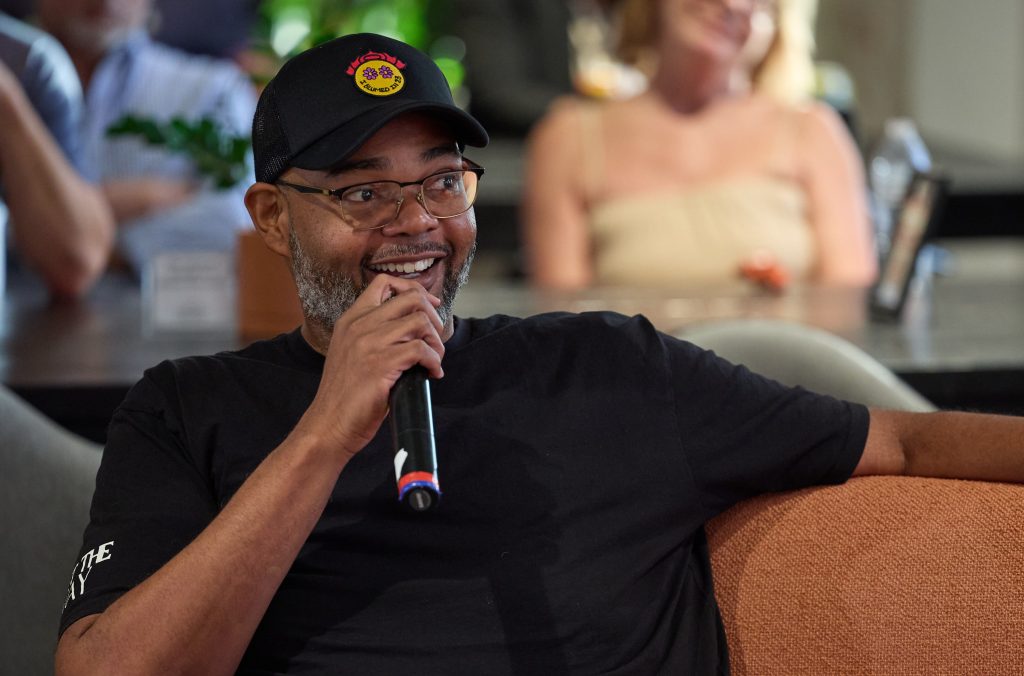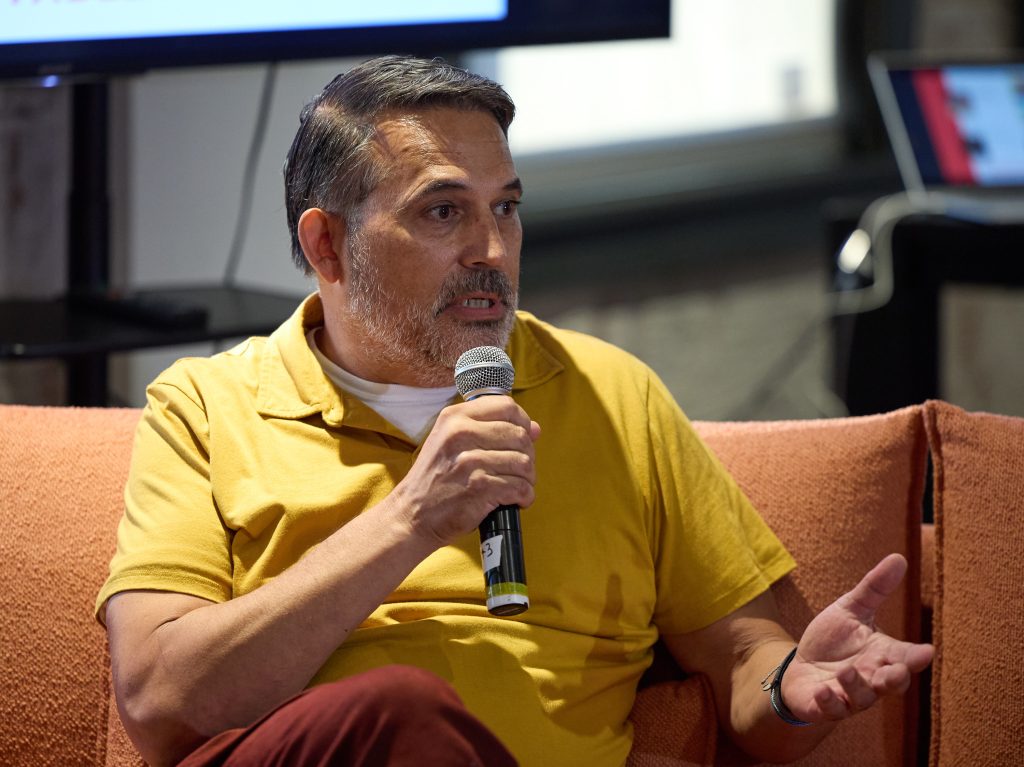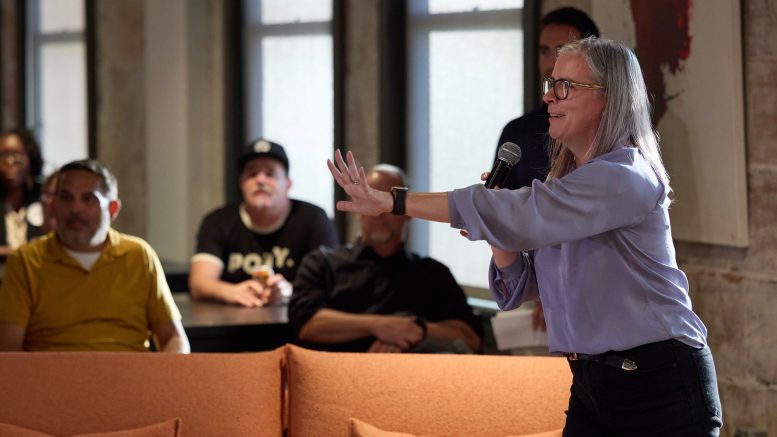By Scott Thomas Anderson
In the midst of economic turmoil and a now-decade-long housing crisis, Sacramento’s leaders and creative community are trying to take their cooperation with each other to new levels – all in hopes of preserving the city’s artistic soul.
Maybe even growing it.
The latest symposium along these lines happened last Wednesday night when Urban Hive hosted the Engage Sacramento Entertainment and Policy Summit. The event was sponsored by The Sacramento Observer and the Solving Sacramento journalism collaborative.
Artists, policymakers, elected officials and business owners were all on hand to hash out steps for making the local creative economy thrive. It’s an issue that has been highlighted and driven forward by Mayor Darrell Steinberg for most of his tenure, though the public face of innovation around it has been that of Megan Van Voorhis, who Steinberg and the council recruited in 2020 to be the city’s de facto arts and entertainment tzar. Her current title is Director of Convention and Cultural Services. Under Van Voorhis’ leadership, the city launched a massive surveying effort to see what shape its artists and creatives were in coming out of the pandemic.
Those efforts found, among other things, that Sacramento’s live music ecosystem is “out of balance” and hard for performers and venues to survive in. Coordinating with Americans for the Arts, Van Voorhis and her team also determined that the arts and culture industry in Sacramento County generated $241.7 million in 2022 alone, along with supporting nearly 4,400 jobs and yielding $164.8 in personal income.
“A lot of people use the term arts and culture and creative economy interchangeably, but that just does not do justice to what is the true creative economy in Sacramento,” Van Voorhis pointed out as she gave the keynote for Wednesday’s summit.
She went on to say that addressing income shortfalls, livability issues, economic disparity gaps and the lack of property ownership among artists and creatives will all be key to making Sacramento reach its full cultural potential.
“Sacramento creative professionals – they’re diverse, collaborative and respected around the country in passionate subcultures,” Van Voorhis noted. “They’re underfunded, disconnected from pools of capital …. They’re determined to make it work in Sacramento. And, you know what? They are the most likely to get displaced because of the contributions that they’re making.”

Photo by Fred Greaves for Solving Sacramento
Van Voorhis detailed that the city’s most cutting-edge experiments at the moment include putting $750,000 into an accelerator program of creative businesses in Sacramento, funding $250,000 in local journalism projects around the arts (SN&R is beneficiary through its work with the nonprofit Solving Sacramento Journalism Collaborative), piloting alternative capital allocation models and looking for ways to incentivize property ownership for creatives.
That last point was something Van Voorhis re-iterated again.
“This is a big deal, because I have worked in this field for so long, and I have watched people create activities and work in neighborhoods and produce value and not have the ability to capture that value,” she reflected. “And then, the next thing that happens to them is that there’s a Starbucks right where it was, and they get pushed out. And they’re tired of it. The people that I talk to, they’re fed up with that. We need to figure out new ways to enable people to own, because that contributes to generational wealth.”
Van Voorhis’ keynote was followed by a lengthy panel discussion on the city’s current efforts to balance code enforcement and safety needs with a new, better way of issuing permits for entertainment events.
The panelists consisted of Tina Lee-Vogt, Sacramento’s Nighttime Economy Manager, Dustin Hollingsworth, part of Van Voorhis’ team at the city, Chaez Boswell, owner of The Rink Studios in North Sacramento and Jim Cornett, owner of Harlow’s nightclub in Midtown.
Similar to feedback he gave to SN&R and Solving Sacramento at a listening session three weeks ago, Cornett expressed a degree of optimism that city staff was finally coming up with better-permitting strategies to help nightlife survive.
“It’s no easy to operate,” Cornett said of owning a live music venue. “It doesn’t matter how much money we have, how much experience we have, or the plan we have. It’s still tough for us to get by. It doesn’t mean we’re going to succeed. But, you know, I worked for years in San Francisco and nobody listened to our complaints. Sacramento listens. They may not do things as fast as we want, and we’re still frustrated – and they listened to us, even though we’re bitching at them all the time. They still pick up the phone”
He added, later, that when creatives call the city they should know what they want to talk about.
“Give them a reason why it’s not working and what you think could help speed it up and make the process cleaner,” Cornett emphasized. “We can’t just bitch.”

Photo by Fred Greaves for Solving Sacramento
Sacramento’s incoming city councilman for Downtown and Midtown, Phil Pluckebaum, was on hand to hear the testimonials.
“Our job is going to be figuring out how to support you – clear the impeditive and make [the arts] viable,” Pluckebaum assured the crowd. “We’re looking for as much possible opportunities.”
District 5 Councilwoman Katie Maple echoed those sentiments at the event.
Yet given the monumental force that Mayor Steinberg played it bringing things this far, many gathered at the summit wanted to hear from the two candidates vying to replace him.
And they did.
“One thing we should really think about is that Sacramento is changing forever, Downtown,” candidate and current assemblyman Kevin McCarty pointed out. “After the pandemic, it’s very, very different. We have an opportunity to reshape our urban core. You know, Downtown, here, 45% of the buildings are state-owned with zero property taxes. What if we turned them over and built more housing? What if we had more entertainment venues? More arts, more culture. I think that would make Sacramento more of a destination city.”
For her part, Dr. Flo Cofer agreed with Van Voorhis that more sustainable funds need to be identified for the city’s artistic heartbeat and the health of its creative economy. But, she added, it’s clear from recent history that politics and leadership count on that scoreboard.
“The arts are such an important part of our city, and that’s actually one of the reasons why my third commission for the city was Measure U, because – you’ll remember, in 2018 when it was passed – the second half-cent was supposed to go to inclusive economic development, the creative economy and the affordable housing fund,” Cofer remembered. “And, unfortunately, the city didn’t honor those promises made during the campaign; and so the dollars didn’t go where they were supposed to … That’s a broken trust with the voters.”
This story was supported by a grant from James B. McClatchy Foundation.


Be the first to comment on "Sacramento’s creative community and city leadership are trying to push forward, together, on saving the arts"